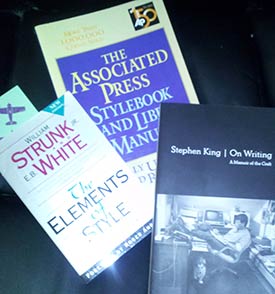 Do you think you can find 7 spare minutes each week? Do you think you could improve one of your most vital business skills with that time? Yes, I’m talking about communication. Whether you’re sending a text or drafting a formal letter, getting your thoughts across quickly and clearly can make a huge difference.
Do you think you can find 7 spare minutes each week? Do you think you could improve one of your most vital business skills with that time? Yes, I’m talking about communication. Whether you’re sending a text or drafting a formal letter, getting your thoughts across quickly and clearly can make a huge difference.
Your writing will affect the impression you make. It will impact how quickly people are able to start acting on your instructions and how well they’ll understand you. It’s easy to forget how much it matters.
Find 7 minutes in your week (or everyday if you’re up for it!) Use that time to read 500 to 1,000 words. Then, keep what you’ve read in mind during the week.
Anyone can read a book about writing. It’s what you do with that information that counts.
Take in just a bit of instruction and, if you actually incorporate it into your thought processes, it can make a huge difference. Do that every week and you’re sure to see steady improvement.
You won’t become the next Shakespeare this way. Practice can’t turn you into a virtuoso, but it can help you improve. Every little bit helps.
You’ll need a starting place for your 7 minutes. Here are some books that I’ve found especially potent.
- On Writing by Stephen King – I just finished this one. It’s the reason writing is on my mind today. There are some interesting autobiographical parts with a very solid writing guide in the middle.
- The Elements of Style by William Strunk Jr. and E. B. White – King’s book turned me on to this one. It’s full of short sections (perfect for 7 minutes) about all aspects of writing clearly and vigorously.
- The AP Stylebook – This is more of a reference book, but I find that I can usually find something worth knowing by flipping through it for a few minutes.
- Persuasion: The Psychology of Influence by Robert Cialdini – It’s not a writing book, but so much of business writing involves persuasion that I think it belongs here.
Of course none of the advice you’ll read is written in stone. Writing is communicating. The correct way to write something is the way that gets your idea across with clarity. Rules and advice help you do that better and with less effort.
Why don’t we make this post count as your 7 minutes for the week? For the next week, keep these things in mind when you write.
Omit needless words.
–William Strunk Jr.
Use short sentences.
— Kansas City Star style guide (where Hemingway got his start)
The most valuable of all talents is that of never using two words when one will do.
–Thomas Jefferson
Do you have a favorite writing resource? I’d love to know about it.
 I’ve put together these 7 rules from a few different sources:
I’ve put together these 7 rules from a few different sources: